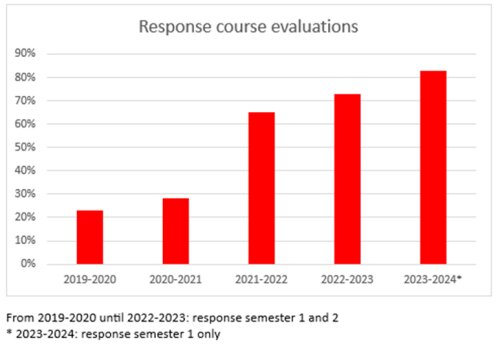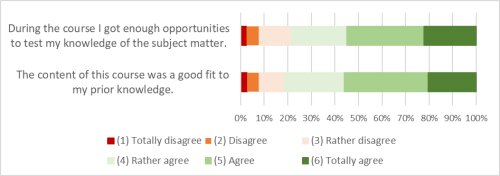Students at UAntwerp are regularly invited to participate in course evaluations. This allows them to give feedback on the teaching in the courses.
The purpose of these evaluations is to enable both lecturers and our university to monitor and continuously improve teaching. The results are used as part of the assessment of lecturers and as input for decisions on course development and curriculum revision.
Respons
Since 2021-2022, these surveys have been mandatory for students, resulting in a much higher response rate than before. This is a good evolution because feedback becomes stronger the more students participate in these surveys. Moreover, analyses show that the mandatory nature of these evaluations does not affect the quality of responses. The graph below shows the increase in response rates to the course evaluations over the past 5 years

All faculties achieved a high response rate on the survey for the first semester of 2023-2024 as shown in the table below. The response rate across the institution as a whole is as high as 83%. Among faculties, the response rates vary between 78% and 93%. A very good result!
| Faculty | Response sem 1 2023-2024 |
| Antwerp School of Education | 78% |
| Business and Economics | 84% |
| Pharmaceutical, Biomedical and Veterinary Sciences | 93% |
| Medicine and Health Sciences | 88% |
| Institute of Development Policy | 85% |
| Arts | 80% |
| Design Sciences | 79% |
| Law | 87% |
| Social Sciences | 82% |
| Applied Engineering | 84% |
| Science | 85% |
| Total UAntwerp | 83% |
Main results
The results of course evaluations are fed back to the lecturer and are discussed in the faculty CIKOs (Cell for Innovation and Quality Assurance in Education). For each question, there are six response options ranging from very negative (score 1) to very positive (score 6). Visually, we represent the results in the graphs below by colouring the negative answers in the graph orange and the positive ones green.
390 courses from the first semester of academic year 2023-2024 were evaluated based on 22 040 completed surveys. The results of all the surveys combined show that the median for each question is 5 out of 6. This means that at least half of the students surveyed (50%) answered 5 or 6 to each question, which is very positive!
The graph below shows that according to about 20% of the students, the biggest margin for growth can still be realised on the aspects formative assessment that supports the learning process and connection to prior knowledge. Please note: approximately 80% of the students answered these questions with a high score, which means that the quality of education on these points is certainly positive!

The most positive scores are found on the aspects of help from the teacher during the learning process and the availability of study materials. On these aspects, 95% of all students give a positive answer for all courses. With the first strong point, students recognise what UAntwerp stands for: an institution where lecturers care about every student.
The video below shows the process of what happens exactly with the results of the course evaluations at UAntwerp.
How can completing a survey contribute to educational quality?
